The Winter 2019 Anime Preview Guide
The Rising of the Shield Hero
How would you rate episode 1 of
The Rising of The Shield Hero ?
Community score: 4.5
What is this?
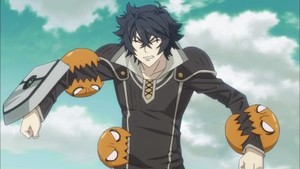 Naofumi Iwatani is just your average otaku college student, happily living at home ever since he helped get his brother back on the straight and narrow. When he's out of cash, he enjoys going to the library and checking out light novels, which is exactly what's what he's doing when suddenly a book called “The Four Cardinal Heroes” emits a bright light and summons him to another world. Naofumi finds himself in the book's world along with three other guys, and they soon find out that they've been summoned to save this world from destructive events known as “Waves.” But something is definitely amiss – while the other three heroes not only have basic knowledge of their new game-like world from games they played, Naofumi's totally in the dark – and the kingdom also doesn't seem too happy to have him as the Shield Hero. When a woman named Myne frames him for assault, Naofumi finds himself thrown out of the castle and forced to make it on his own in this strange new world, with his reputation and faith in humanity in tatters. What will happen to him now that his isekai fantasy has become a nightmare? The Rising of The Shield Hero is based on a light novel series and streams on Crunchyroll on Wednesdays.
Naofumi Iwatani is just your average otaku college student, happily living at home ever since he helped get his brother back on the straight and narrow. When he's out of cash, he enjoys going to the library and checking out light novels, which is exactly what's what he's doing when suddenly a book called “The Four Cardinal Heroes” emits a bright light and summons him to another world. Naofumi finds himself in the book's world along with three other guys, and they soon find out that they've been summoned to save this world from destructive events known as “Waves.” But something is definitely amiss – while the other three heroes not only have basic knowledge of their new game-like world from games they played, Naofumi's totally in the dark – and the kingdom also doesn't seem too happy to have him as the Shield Hero. When a woman named Myne frames him for assault, Naofumi finds himself thrown out of the castle and forced to make it on his own in this strange new world, with his reputation and faith in humanity in tatters. What will happen to him now that his isekai fantasy has become a nightmare? The Rising of The Shield Hero is based on a light novel series and streams on Crunchyroll on Wednesdays.
How was the first episode?
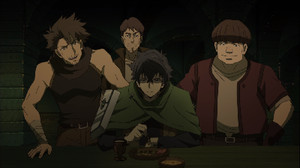 James Beckett
James Beckett
Rating:
Kinema Citrus essentially earned my undying loyalty after producing Made in Abyss, but even I was wary when it was announced that The Rising of The Shield Hero would be their next major project, given the controversial reputation of its source material. It's also no secret that I have become extremely weary of the market's current isekai oversaturation, especially when it comes to fantasy worlds that are little more than generic fantasy MMOs, complete with an encyclopedia of barely custom rules and mechanics that almost always result in a less creative story overall. So my expectations for Shield Hero's premiere weren't exactly high.
Everyone probably knows about the inciting incident that's got people talking about Shield Hero this season already, so let's get the elephant in the room out of the way up front. Making Naofumi's fall from grace the result of his partner Myne falsely accusing him of rape isn't just ethically dubious and needlessly off-putting – it's also lazy storytelling. From the beginning, we see that Naofumi has a reductive view of women overall, judging literally every woman he sees down to a bare-bones sketch of a princess in a book based on his perceptions of their sexuality and attainability. When Myne erroneously describes this new world as “a matriarchy” (despite the ruler being, you know, a king), its proximity to the reveal of Myne's betrayal creates a link between these two elements that's impossible to ignore. The implication, intended or not, is that in a world that venerates women, deceptive snakes like Myne will say whatever they want, and poor Nice Guys like Naofumi will suffer.
Every trick in the book is employed to frame Myne as an exaggeration of the duplicitous, promiscuous harpy that uses her beauty to lure men to their doom, and Naofumi is the innocent everyman who's punished for being too trusting, thus justifying the hatred and misanthropy that follows him. It's not just a cliché, it's a fantasy of persecution that's frequently propagated by men in order to justify mistreatment and mistrust of women. It would be foolish to say that no person has ever falsely accused another of assault, but the fact is that society more often does not take allegations of assault seriously and often punishes victims for speaking up about it. The situation is so bad that the majority of victims choose not to report sexual violence, because it is assumed that they will be ignored or harassed further. This is why Rising of the Shield Hero's treatment of this subject matter deserves to be discussed. The idea that men are aggrieved victims of some matriarchal conspiracy is not only an imaginary boogeyman, it's something that has caused real harm in the world outside this work of fiction.
The other reason I felt the need to take so much time addressing Rising of the Shield Hero's central controversy is because the rest of the show is so unforgivably boring. Naofumi is a completely uninteresting protagonist 70% of the time and a complete tool for the other 30%. He's only the most "likable" member of the cast so far because everyone else is either a paper-thin nobody or an unrepentant asshole. The fantasy world itself has no unique qualities of its own – for all I know, it may as well be the same setting as Death March to The Parallel World Rhapsody. The only true conflict in this double-length premiere, which is constantly hammered home through the episode's awful monotonous dialogue, is that Naofumi feels like a loser for being stuck as the Shield Guy. It's contrived, silly, and in no way warrants so much runtime. Shields are perfectly capable deadly weapons. People have been murdering other people with shields since the literal dawn of human civilization. Watching a stale cracker of a protagonist get dunked on for an hour because he's been assigned a role that millions of MMO players fulfill just fine every day does not a good premiere make.
Rising of the Shield Hero has only one redeeming quality, and that is its production values. Kinema Citrus still knows how to bring this world to life in vivid color, even if the overall direction is mostly lifeless, and Kevin Penkin's score is wonderful as always. I joked at the beginning of the season that Penkin's music would be the only reason I watched this show, but even that turned out to be setting the bar too high. Even if the Myne plot were completely cut out, this show would still feel like a waste of time, because it offers absolutely nothing we haven't seen done better a dozen times before. I'll be more than happy to simply buy the OST when it comes out and not waste any more time with this nonsense series.
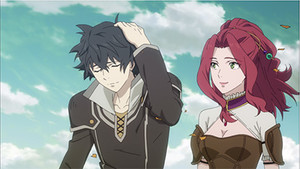 Paul Jensen
Paul Jensen
Rating:
Going into this premiere, I knew next to nothing about The Rising of The Shield Hero, except that it's an isekai series surrounded by some sort of controversy. Well, now I know why people have been arguing about this one, and the timing of this adaptation certainly doesn't do it any favors. It seems like an unbelievably bad time to start an anime series with the main character being falsely accused of sexual assault. That premise makes the show seem tone-deaf, and I imagine it'll drive away some potential viewers. But for me, this premiere had issues that went beyond just one ill-conceived plot device.
Even if you gloss over the details of how Myne sets up Naofumi, The Rising of The Shield Hero gives off an excessively grim and gloomy first impression. That's not necessarily a bad thing on its own, but a dark fantasy story needs to offer either some sort of entertainment value or have an interesting thematic purpose behind its intensity. Unfortunately, this series doesn't seem to have either of those at the moment. The only real combat we see amounts to a dude clumsily popping little balloon monsters, which is slightly funny but fails to scratch the old “blood and gore” itch in any satisfying way. As for the story's themes, this premiere spends a lot of time piling misery onto Naofumi while devoting precious little energy to telling us why we should care. Outside of the obvious “people are jerks” message, I never felt like the story was gearing up to ask any interesting moral questions. It's just grumpy and mean-spirited without purpose, which isn't at all fun to watch.
If there's a bright spot here, it's that Naofumi's crappy shield forces him to put some real thought into how he's going to defeat even the weakest of monsters. I can see this opening the door for some clever and unconventional dungeon-crawling tactics, especially if he ends up recruiting folks who don't fall into the usual fantasy archetypes. It's also nice to see a series step away from the frequent isekai pitfall of handing everything to the hero on a silver platter, even if this particular example ends up going too far in the other direction. Now, if only we could do something about the RPG menu screens that get shoehorned into all of these shows. I've seen this stuff so often now that I want to beat my head against a wall every time an anime character talks about stats or experience points.
The Rising of The Shield Hero has some potential as an antidote to all the bland “easy mode” isekai stories we've been subjected to in recent years, but my concern is that it goes too far in its efforts to make things tough for Naofumi. Maybe I've just gotten too old for this particular brand of dark storytelling, but I need to see much more insightful writing if I'm going to sit through a whole season of people being nasty to one another. Your best bet might be to check back in six weeks or so to see if it's either lightened up or gotten more nuanced in its messaging.
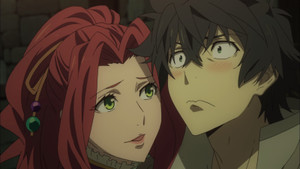 Nick Creamer
Nick Creamer
Rating: burn it and salt the earth
I knew Shield Hero by reputation long before this season, so I was prepped for it to be one of winter's most controversial anime. I knew that the young man from our world who's transported into a fantasy realm would be known as the unloved “shield hero,” and that the plot would commence with a false rape accusation that destroys his reputation. That by itself made me uneasy, so I should probably explain my reservations now.
Framing a show around a false rape accusation doesn't automatically make for a terrible story, but it does potentially provide an indicator of where the author is coming from. Though some authors are more transparent in their attempted social commentary than others, each choice a writer makes will carry with it some unavoidable real-world baggage. A false rape accusation isn't always the wrong choice, but it is always a weighty choice that relies heavily on context. We exist in a world where rapes are staggeringly under-reported, women are constantly shamed and attacked for acknowledging abuses against them, and false rape reports are a tiny statistical aberration, vastly overshadowed by the number of assaults that are not reported at all. Given all this, Shield Hero's premise feels like a tone deaf story choice at best, and an indicator of the author's own feelings about women at worst.
In context, Shield Hero's premiere did every conceivable thing in its power to communicate that this was the latter case. But this author isn't just angry at women—his bitter paranoia extends to basically everyone around him.
This premiere's mundane failings are endemic to the isekai genre, which at its worst represents a hollow shell of masturbatory otaku reference scrabble. Protagonist Iwatani Naofumi opens by telling us he's a “normal otaku,” implying that this work is aimed at an audience where normalcy means deep entrenchment in niche nerd media, specifically the kind where characters only tend to express themselves through tropes from anime or light novels they've experienced before. Soon, Naofumi is transported to an utterly unconvincing fantasy world, where he learns that magic and skills and even personal development all work just like a JRPG, complete with character stats. This kind of world-building has become the default for the isekai genre, where an uninspired author will regurgitate tabletop tropes without much creativity instead of sculpting a living, breathing world. Dreaming of other worlds only as harem-friendly versions of Dragon Quest feels pretty depressing to me, but I realize it's usually meant to be the draw of this creatively anemic genre.
Once we've gotten through the clumsy, overlong, and predictable worldbuilding—wait, you know what, I shouldn't just gloss over that stuff. To simply handwave this show's worldbuilding as lazy would ignore how choices like “the four heroes cannot party together” and “the shield hero can only use shields” are delivered not as natural consequences of dramatic circumstance, but literally dictated to our leads through an electronic voiceover that guides all their actions. This is terrible storytelling that feels like a natural consequence of assuming “it's just an RPG” is good enough fantasy worldbuilding. If you're going to be that derivative, why not go all the way and base all your drama on “this happened because the game says I should do this next"?
Anyway, once we've gotten past the worldbuilding, we get to the actual point of this show: everyone is mean to the Shield Hero even though he's super nice and great. Though Naofumi himself is already unlikable in a casually misogynistic way (at one point he assesses a very vague drawing of a woman to be “too slutty to be a princess”), all of his compatriots are pointlessly rude and mean to him at all times. There's not much established motivation for them to hold a grudge against him; they're just mean because someone at some point was mean to the author, and this is his way of working through those feelings. There's no depth to any of Shield Hero's supporting cast, because they have no emotional interiority—they only exist insofar as they react to the Shield Hero, and since this is a vengeful power fantasy, their reactions to him are at all times nonsensically negative. Emotionally rich storytelling demands investment in and sympathy toward others, but so far Shield Hero only offers a purely reactive shell of some fabricated reality.
“I'm the greatest but no one appreciates it” is a common premise in isekai, but Shield Hero goes one step further by baking this assumption into the actual lore of its universe. Despite the Shield Hero ostensibly being one of the four people who will save this planet, everyone immediately responds to Naofumi with resentment and derision, presumably because that's how the author sees certain people around him. It'd be hard enough to buy into this under-developed video game world under any circumstances, but the fact that this world's salvation myth has to constantly justify the protagonist's relentless victim complex makes it feel even less like a complex narrative and even more like an unpleasantly bitter venting exercise.
That brings us all the way back to the rape accusation. After a day of adventuring with his one party member, Myne Suphia, Naofumi wakes up to find himself falsely accused of rape and hated by basically everyone. Through the course of a “trial” that feels eerily similar to several paranoid conspiratorial memes about feminists I've seen online, Naofumi finds himself villainized by everyone, crucified by all of the author's social anxieties and hangups about women at once. “Her kindness was all fake,” Naofumi thinks to himself, articulating the resentment of a million boys angry that simple kindness did not equal sexual interest from a woman. “We should never have summoned the shield hero,” cry the people, succinctly summing up this show's contradictory sense of martyrdom. Frankly, I agree with them. Unconvincingly developed and emotionally sterile as this world may be, it deserves a better class of hero than this.
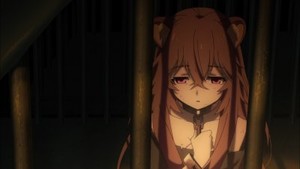 Rebecca Silverman
Rebecca Silverman
Rating:
Aneko Yusagi's story for The Rising of The Shield Hero can initially be hard to stomach. Seeing Naofumi get beaten down from starry-eyed hopeful hero to a man who trusts no one to the point where buying a slave seems like the only viable option for trustworthy companionship is pretty rotten. (And yes, slavery will be a troubling theme throughout the series.) It's also difficult seeing everyone turn on him so quickly when it's so obviously a setup – not only do we see Myne deliberately try to get him drunk before saying “screw it” and executing her plan anyway, but she also makes it clear that she's doing this deliberately to discredit Naofumi as the Shield Hero.
The Shield Hero being the least respected of the four summoned heroes is something that we see play out more slowly over this double-length episode. Our first real hint comes when the crowd at the heroes' introduction ceremony murmurs uneasily while looking at Naofumi; the second is when the king attempts to breeze right past him without allowing him to introduce himself. By the time Naofumi is faced with no one being willing to join his party, he's already aware that there's something seriously wrong with the way he's being treated compared to Ren (sword), Itsuki (bow), and Motoyasu (spear); Myne's ploy is a way to lull him into a false sense of security as well as an easy way to turn the other heroes against him.
As far as an adaptation goes, this is so far fairly faithful. The art gives a nice sense of a Medieval-based fantasy world, the animation is good, and more importantly, the story is playing out without the clunky-ness of the novels' execution. The gamelike conceit of the world works better when the narrative isn't regularly interrupted by status updates – in the anime, a shot of Naofumi's status screen is less of an issue than an entire paragraph in the middle of the action listing off his stats. Having a voice for Naofumi also helps give us a better sense of the dramatic shift in his outlook, because those early volumes of the novel weren't quite up to the task.
Part of the books' appeal is the emotional hook that Naofumi refuses to recognize his own humanity underneath all the hurt and bitterness. Raphtalia, the character who's about to make her entrance, contributes to that, but so does Naofumi's refutation of isekai “game world” tropes. If that's appealing to you, it may be worth sticking around to see things really get going, but it's also safe to say that this series' premise won't be to everyone's tastes.
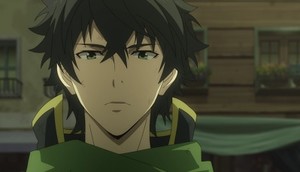 Theron Martin
Theron Martin
Rating:
This isekai series has already proven controversial based on a few key points of its premise, and after seeing the double-length first episode, I can understand why. So for my part, I wanted to see whether or not there was anything to this series beyond the controversy.
To get straight to the point, this story pivots on a false rape accusation against the main protagonist, with the strong implication that he was deliberately set up by Myne, the young woman who changes her mind and decides to work with him after initially supporting someone else. It was clear that she intended to take advantage of him from the beginning, but throwing in the rape accusation did seem unnecessary; perhaps the rationalization is that she wanted to cover her tracks by putting Naofumi into a situation where his word was being pitted most directly against her own? It certainly works out that way, which creates the first major issue that some viewers will have with the series. Given what's been going on in the world lately, the timing of this premise probably couldn't have been worse.
Setting aside this element, the end result of putting the protagonist in a place where the whole world has turned against him so that he has to claw his way up to success from nothing is pretty standard territory. If it feels unique, that may just be because it hasn't been employed much in isekai stories. (The Twelve Kingdoms is one fairly dated example.) The mechanics of the situation allow Naofumi to be regarded as a criminal but also make it impractical for him to be incarcerated, which seems too convenient, but I guess a prison break storyline just wasn't in the cards for the author. Ultimately, we end up with an embittered protagonist who's become a social pariah, having to play hardball just to scrape by.
That angle actually has some story potential. The notion that all four heroes are from different versions of modern Japan is also an intriguing twist, though I can't see that having much long-term story relevance. Naofumi's abilities with a shield also show some promise; he won't ever be much of an attacker, but since it can take on different configurations with different abilities, he'll be an ideal role-player within his eventual adventuring party. This helps to offset the heavy emphasis on game mechanics (which is increasingly annoying me in isekai adaptions that aren't literal game worlds), the blandness of the other heroes and the basic premise, and the unremarkable technical merits and setting design.
The episode then ends on another controversial moment; this isekai looks to be going the slave route. The slave girl shown in the final shot is featured prominently on source novel covers and promotional artwork, so I'm presuming that Naofumi will buy her as a regular cast member. We'll have to see how that plays out, but for now, the series is off to a troubled but not irredeemable start.
discuss this in the forum (621 posts) |
this article has been modified since it was originally posted; see change history
back to The Winter 2019 Anime Preview Guide
Season Preview Guide homepage / archives